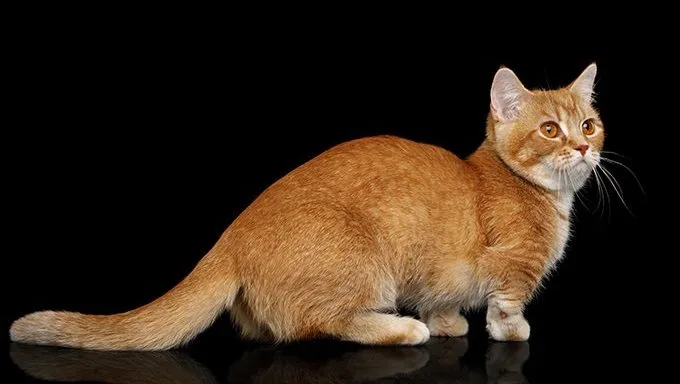Dwarfism in cats, scientifically known as “achondroplasia,” is a genetic condition that affects the development of their bones. Just like in humans, dwarfism in cats results in shorter limbs and sometimes a slightly rounded appearance. But don’t let their small size fool you; these cats have huge personalities and can steal your heart in an instant!
Types of Feline Dwarfism
Feline dwarfism comes in a few different flavors, each with its own unique characteristics:
Munchkin Cats
Munchkin cats are perhaps the most well-known dwarf cat breed. These little guys have short legs due to a genetic mutation that affects their bone growth. Despite their small stature, Munchkins are agile and active, making them excellent jumpers and climbers. Vets recommend regular check-ups for Munchkin cats to ensure their joints stay healthy.
Scottish Fold Dwarfs
Scottish Fold cats are famous for their unique folded ears, but some of them also carry the dwarfism gene. These Scottish Fold dwarfs may have shortened limbs in addition to their distinctive ears. Because of their special needs, it’s important to consult with a veterinarian experienced in dwarf cat care to ensure they receive the proper attention.
Dwelf Cats
Dwelf cats are the result of crossbreeding between the Munchkin, Sphynx, and American Curl breeds. These little beauties have short legs and hairless bodies with curled ears. Due to their hairless nature, they require extra protection from the sun and cold weather.
Bambino Cats
Bambino cats are another product of crossbreeding, this time between the Sphynx and Munchkin breeds. They have the hairless trait of the Sphynx and the short legs of the Munchkin. Regular skin care is a must for these kitties, as they are prone to skin issues.
Caring for Dwarf Cats
Taking care of a dwarf cat requires a little extra TLC, just like caring for any unique pet. Here are some tips to ensure your pint-sized companion lives a happy and healthy life:
Regular Vet Check-ups
Dwarf cats are more prone to certain health issues, especially those related to their joints and bones. Regular check-ups with a trusted veterinarian are essential to monitor their overall well-being and catch any potential problems early.
Proper Diet and Exercise
Maintaining a healthy weight is crucial for dwarf cats to reduce stress on their joints. Consult your vet for a diet plan tailored to your cat’s specific needs. Encourage gentle exercise to keep them active without straining their limbs.
Special Considerations for Hairless Varieties
If you have a hairless dwarf cat like the Dwelf or Bambino, remember to protect them from the sun’s harmful rays with pet-safe sunscreen and provide warm clothing during colder months.
Safe Environment
Ensure your home is safe for your dwarf cat by removing potential hazards that could lead to accidents or injuries. Consider providing ramps or steps to help them reach high places without jumping.
Dwarf Cats: A Unique and Loving Companion
In conclusion, dwarf cats may be small in size, but they’re enormous in personality and charm. These unique felines come in various breeds, each with its own special characteristics and care requirements. Remember, when you decide to welcome a dwarf cat into your home, you’re taking on the responsibility of caring for a one-of-a-kind and lovable companion.
For more in-depth information on dwarf cat care, consult with your local veterinarian or reputable feline organizations. And always remember, dwarf cats may be pint-sized, but they’ll fill your heart with joy in a way that only a cat can!
- Best Dun & Bradstreet (DNB) Alternatives for 2025 - April 19, 2025
- Best 6sense Alternatives for 2025 - April 18, 2025
- Best Instantly.ai Alternatives for 2025 - April 18, 2025



